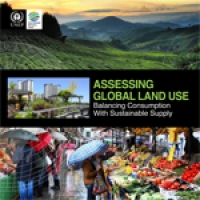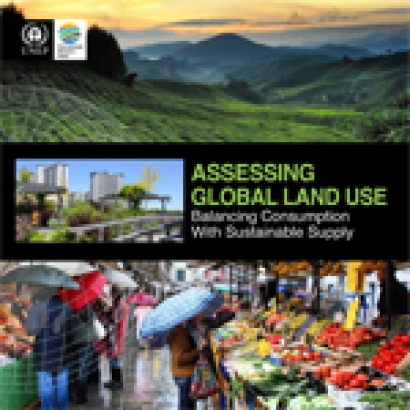Assessing Global Land Use. Balancing Consumption With Sustainable Supply
"Since its inception, UNEP's International Resource Panel (IRP) has focused its efforts on bridging the gap between science and policy to generate sustainable, effective and realistic solutions to challenges in global resource management. The Panel's report 'Decoupling Natural Resource Use and Environmental Impacts from Economic Growth', shows that breaking the link between human well-being and resource consumption is both necessary and possible.
[...] In this second report, Assessing Global Land Use: Balancing Consumption with Sustainable Supply, the working group provides a comprehensive global assessment of increased pressures on natural resources from food, fuels and fibre, identifying the main drivers and providing innovative, practical options to mitigate their impacts.
There is a growing recognition that the complexity of today's resource management challenges calls for trade-off analysis and integrated solutions and this report responds to this call. A central question answered by the authors is the extent to which global cropland can expand to serve the growing demand for food and non-food biomass, while keeping the consequences of land use change, such as biodiversity loss, at a sustainable level.
Under business as usual conditions, the growing demand for food and non-food biomass could lead to a gross expansion of cropland in the range of 320 to 850 million hectares by 2050. Expansion of such magnitude is simply not compatible with the imperative of sustaining the basic life-supporting services that ecosystems provide such as maintaining soil productivity, regulating water resources, sustaining forest cover or conserving biodiversity.
The report finds that gross expansion of croplands by 2050 could be limited to somewhere between 8 per cent and 37 per cent, provided a multi-pronged strategy is followed for meeting the food, energy and other requirements of the global economy. Such a strategy would need to increase efficiency levels across the life cycle of agricultural commodities and also in the use and re-use of land-based resources.
This definitive report is the result of a thorough research and review process completed under the guidance of the Land and Soils Working Group. It benefited from several rounds of discussion with the members of the International Resource Panel, and its Steering Committee as well as from an external peer review process. Its conclusions give policy makers and practitioners a solid basis for immediate action on many fronts, both to reduce degradation of land and soils and also to initiate measures to regenerate areas that have been damaged or destroyed. Obvious ones would include the development of national programmes for resource efficiency (including global land use for domestic consumption) and the establishment of a fund for the regeneration of degraded soil. Others are referred to in the report."




